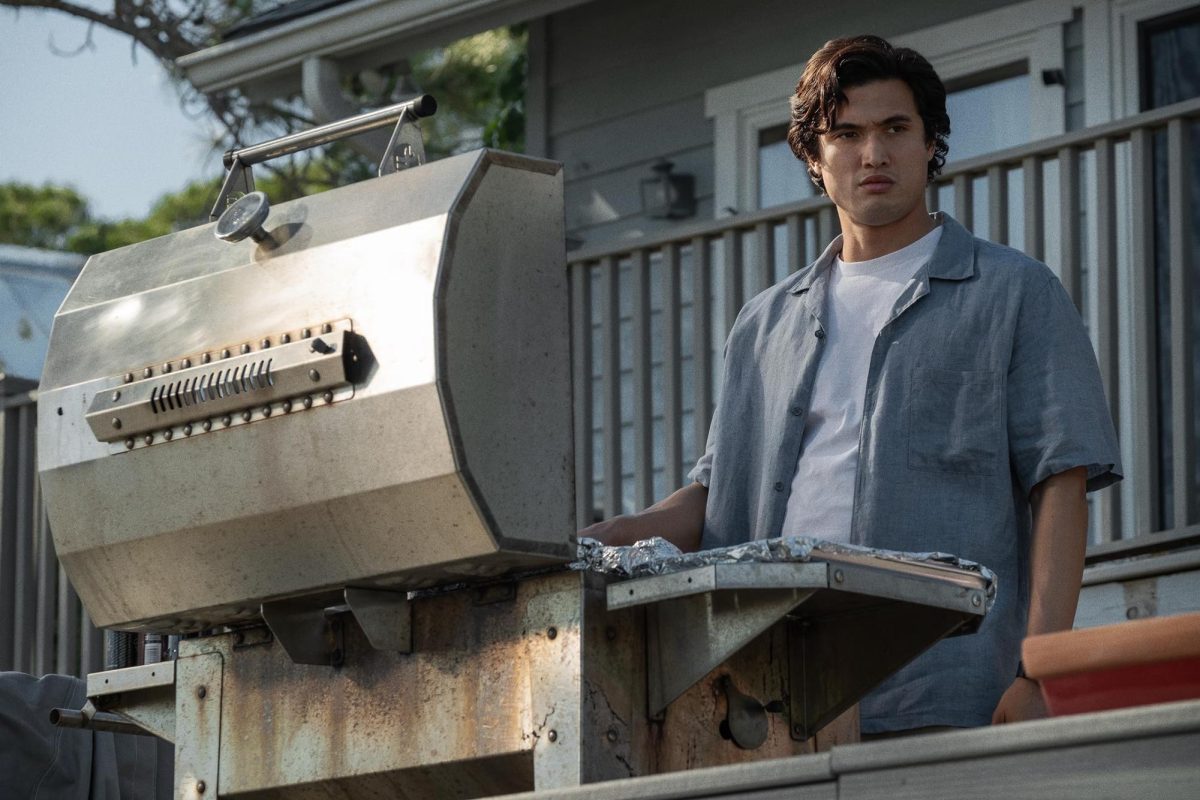In a year of multimillion-dollar blockbusters and critically acclaimed arthouse films, supporting actors took center stage. Whether it was Ryan Gosling’s iconic performance as Ken in “Barbie” or Mark Ruffalo’s portrayal of a devious, sex-crazed Victorian-era lawyer in “Poor Things,” audiences gravitated toward these characters who stole every second they were on screen. It is in these secondary roles that these stories were most relatable, delivering absurd comedic beats and deeply vulnerable moments. Yet, in this year’s Oscar nominations for best supporting actor — a list stacked with high-profile Hollywood talent — Charles Melton’s “May December” performance was noticeably excluded from the roster.
Written by Tisch alumni Samy Burch and Alex Mechanik, “May December” rightfully earned a nod from the Academy in a nomination for best original screenplay. The darkly comedic script was loosely inspired by the tabloid fodder surrounding Mary Kay Letourneau, who was a teacher convicted in 1997 for sexually abusing a student.
In their fictionalized account of the scandal, an actress named Elizabeth Berry (Natalie Portman) prepares to play the abuser, Gracie Atherton-Yoo (Julianne Moore), in a biopic years after the incident. Like Letourneau, Gracie ends up marrying and starting a family with the previously underaged boy with whom she had an affair. As part of her method, Elizabeth visits Gracie and her picture-perfect family in the hopes of absorbing as much of her character as she possibly can.
Of all of Gracie’s friends and family that she interviews for her research, Elizabeth takes particular interest in her husband — or victim — Joe Yoo, played by Melton. The two end up starting an unexpected and disturbing love affair, digging up years of unprocessed trauma, with Melton brilliantly capturing the psychological turmoil as he confronts the reality of his troubling past.
You may recognize Melton as the bodacious jock Reggie Mantle from the incredibly clowned-on teen drama “Riverdale,” or as the lead of the teen romance film “The Sun is Also a Star.” You may even know him from one of his first film roles in YouTuber Logan Paul’s movie, “The Thinning: New World Order,” a sequel to “The Thinning” — the fact that Paul has an actual filmography is just further proof that we live in a simulation.
With his newest role, Melton joins a league of men who underwent the Hollywood teenage-heartthrob-to-respected-actor pipeline, “rising from the ashes of ‘Riverdale’ like a phoenix from the flames.” Some other members of this exclusive club include Jacob Elordi, the critically acclaimed star of “Priscilla” and “Saltburn,” who owes his rise to fame to his role in the wonderful trainwreck that is the “Kissing Booth” franchise. A seasoned favorite is Robert Pattinson, who famously despised his role in the “Twilight” franchise, though it helped him dominate the cultural mainstream.
It is impressive that in his first serious, dramatic role, Melton goes toe-to-toe with two seasoned Hollywood veterans. At the center of the film is an unsettling psychological showdown being played out by Portman and Moore. Through the mirroring of subtle gestures, facial expressions and verbal mannerisms, the two characters engage in an existential tango of vanity. Both women embody Hollywood artifice: fake smiles and insincere platitudes that barely conceal the unbearable weight of their own self-absorbed narcissism. Caught between the crossfire of toxic white femininity, Melton’s Joe brings a touch of fragile innocence to the narrative.
Despite his hefty 6-foot-1-inch build, he is soft-spoken and has a sheepish demeanor, much like an introverted preteen at a large family function. His relationship with a woman 23 years older robbed him of a normal life. He is a sexually frustrated child trying to fill the shoes of a supportive husband and a nurturing father figure. In one of the film’s most memorable scenes, Joe joins his son Charlie (Gabriel Chung) on the roof of their home the day before his high school graduation. In a traditional coming-of-age story, the father would share trite anecdotes about growing up and wise fortune cookie one-liners, finally coming to terms with his child’s ascent into adulthood. Joe, in an attempt to bond with his son, smokes a blunt for the first time and ends up crying in a fetal position. The patriarch is not a beacon of stoic and infallible masculinity, he is but a broken boy. Depicting a victim of grooming can easily become a tacky and offensive ordeal, but Melton finds the nuanced humanity in his character.
While the industry has made efforts to subvert gender roles, the most coveted male parts are often still oozing with machismo. Actors relish in moral gray zones, embodying the mysterious brooding and deranged sociopath types. Melton, who plays a man crumbling at the seams from a life of repressed traumas, stands out among the crowd. In both his brittle physicality and nervous delivery, he completely loses himself in a character that demands crippling weakness. In unabashedly embracing his character’s impotence, Melton delivers a career-defining performance and gives “May December” its captivating emotional core.
Though it’s unfortunate that Melton was snubbed in this year’s Oscars run, his role in “May December” is undeniably one of the biggest breakthrough performances of 2023. With Deadline recently announcing that Melton would be cast on the second season of the Netflix and A24 show “Beef,” along with rumors about him joining Ray Mendoza and Alex Garland’s next project, Melton clearly has a promising career trajectory — one that we all eagerly anticipate.
Contact Mick Gaw and Stephanie Wong at [email protected].

























































































































































